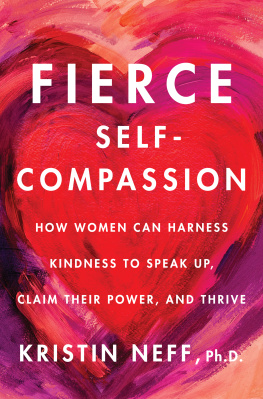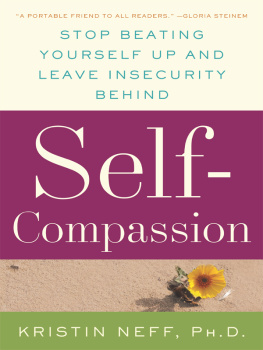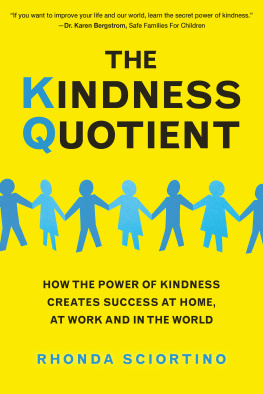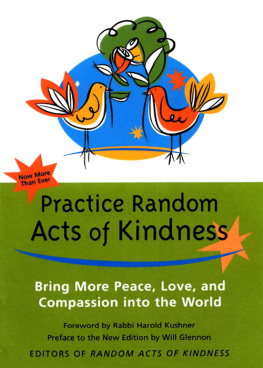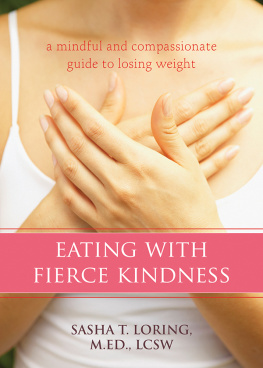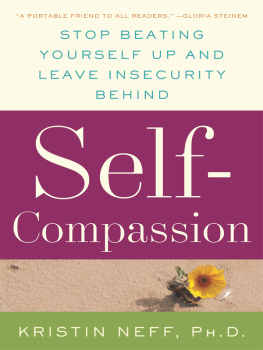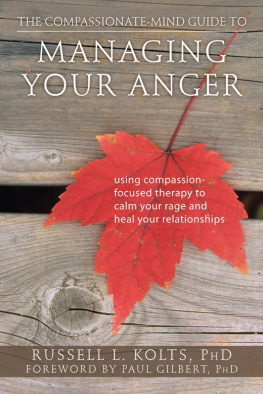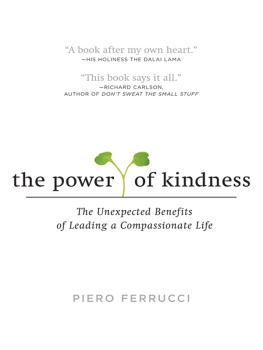Kristin Neff - Fierce Self-Compassion: How Women Can Harness Kindness to Speak Up, Claim Their Power and Thrive
Here you can read online Kristin Neff - Fierce Self-Compassion: How Women Can Harness Kindness to Speak Up, Claim Their Power and Thrive full text of the book (entire story) in english for free. Download pdf and epub, get meaning, cover and reviews about this ebook. year: 2021, publisher: Harper Wave, genre: Religion. Description of the work, (preface) as well as reviews are available. Best literature library LitArk.com created for fans of good reading and offers a wide selection of genres:
Romance novel
Science fiction
Adventure
Detective
Science
History
Home and family
Prose
Art
Politics
Computer
Non-fiction
Religion
Business
Children
Humor
Choose a favorite category and find really read worthwhile books. Enjoy immersion in the world of imagination, feel the emotions of the characters or learn something new for yourself, make an fascinating discovery.
- Book:Fierce Self-Compassion: How Women Can Harness Kindness to Speak Up, Claim Their Power and Thrive
- Author:
- Publisher:Harper Wave
- Genre:
- Year:2021
- Rating:3 / 5
- Favourites:Add to favourites
- Your mark:
- 60
- 1
- 2
- 3
- 4
- 5
Fierce Self-Compassion: How Women Can Harness Kindness to Speak Up, Claim Their Power and Thrive: summary, description and annotation
We offer to read an annotation, description, summary or preface (depends on what the author of the book "Fierce Self-Compassion: How Women Can Harness Kindness to Speak Up, Claim Their Power and Thrive" wrote himself). If you haven't found the necessary information about the book — write in the comments, we will try to find it.
Kristin Neff: author's other books
Who wrote Fierce Self-Compassion: How Women Can Harness Kindness to Speak Up, Claim Their Power and Thrive? Find out the surname, the name of the author of the book and a list of all author's works by series.
Fierce Self-Compassion: How Women Can Harness Kindness to Speak Up, Claim Their Power and Thrive — read online for free the complete book (whole text) full work
Below is the text of the book, divided by pages. System saving the place of the last page read, allows you to conveniently read the book "Fierce Self-Compassion: How Women Can Harness Kindness to Speak Up, Claim Their Power and Thrive" online for free, without having to search again every time where you left off. Put a bookmark, and you can go to the page where you finished reading at any time.
Font size:
Interval:
Bookmark:
To my beloved son, Rowan,
and to all women everywhere
One thing is certain. If we merge mercy with might, and might with right, then love becomes our legacy and change our childrens birthright.
Amanda Gorman, U.S. National Youth Poet Laureate
Theres something in the air. Every woman I talk to can feel it. Were fed up, angry, and ready for change. Traditional gender roles and societal power structures restrict the ability of women to express the full range of who we are, at great cost both personally and politically. Women are allowed to be soft, nurturing, and tender. But if a woman is too fierceif were too angry or forcefulpeople get scared and call us names (witch, hag, shrew, and ball-breaker are some of the milder insults that come to mind). If were ever going to move beyond male dominance and take our proper place at the tables of power, we need to reclaim the right to be fierce. Thats how well make a difference in the issues facing our world today: entrenched poverty, systemic racism, a failing health-care system, and climate change, to start. This book is aimed at helping women do just that.
A valuable framework for understanding how women can make productive change is self-compassion. Compassion is aimed at alleviating sufferingits the impulse to help, an active feeling of concern, the palpable instinct to care for those who are struggling. Although most people naturally feel compassion for others, its harder to direct this instinct inward. The last twenty years of my career have been devoted to researching the psychological health benefits of self-compassion and teaching people how to be kinder and more supportive toward themselves. Along with my close colleague Dr. Chris Germer, weve developed a training program called Mindful Self-Compassion thats taught around the globe. But in order to realize the full benefits of self-compassion, we need to develop both its fierce and tender side.
This is a recent realization for me. When leading self-compassion workshops in the past, I often told a funny and true story designed to illustrate how mindfulness and self-compassion can help us work with difficult emotions like anger.
The story goes like this: When my son Rowan was about six, I took him to see a bird show at the zoo. Once we got settled, Rowan, whos autistic, started being a bit disruptivenot screaming-and-flailing disruptive, but talking-out-loud and standing-on-rather-than-sitting-in-his-chair disruptive. The woman in front of us, her two perfectly behaved little girls sitting next to her, kept turning around to shush Rowan. Rowan wouldnt be shushed. I tried to help him keep quiet, but he was so excited he couldnt control himself. After about her third failed shooshing attempt, the woman turned around and with a crazed look in her eye exclaimed, Will you please be quiet, were trying to hear the show!
Rowan was confused. He turned to me and asked in a frightened voice, Whos that, Mommy?
If anyone does anything at all threatening or aggressive to my son, I turn into Momma Bear. I was furious. So, I told him, Thats a... Well, lets just say I used a word that started with B and it wasnt bearyou can use your imagination. The bird show ended shortly thereafter and the woman turned around to face me.
How dare you call me that! she said.
How dare you give my son the evil eye! I spat back. And we started going at it. Two moms with their little ones by their sides, in a shouting match at a bird show! Luckily, I was practicing a lot of mindfulness at the time (yes, I see the irony) and said relatively calmly, I am so angry right now. The woman responded, Tell me something I dont know. But for me it was a pivotal moment, because instead of being lost in my rage, I was able to be mindfully aware of it, de-escalate, and leave.
Its a great teaching story because it illustrates how skills like mindfulness can help pull us back from the edge when were being swept away by our reactive emotions. But for years I failed to fully appreciate the importance of what happened: that instinctive arising of fierce Momma Bear energy. I took for granted that moment of protective anger and assumed it was a problem when it was actually remarkable and awe-inspiring.
The Marvel Comics writer Jack Kirby was so astounded after witnessing a car accident and seeing a mother lift a three-thousand-pound vehicle to save her baby trapped underneath that it moved him to create the Incredible Hulk. This fierce aspect of our nature is far from problematic; its a superpower. Something to be celebrated rather than merely accepted with mindful awareness. And not only can we use this force to protect our children, we can also use it to protect ourselves, meet our needs, motivate change, and engage in the work of justice. This book is designed to help women tap into our fierce inner warrior, so we can rise up and change our world.
Women still live in a male-dominated society, and we need all the tools we can get our hands on to emerge triumphant but also healthy and whole. One of the most powerful weapons in our arsenal is caring force. Tender self-compassion harnesses the energy of nurturing to alleviate suffering, while fierce self-compassion harnesses the energy of action to alleviate sufferingwhen these are fully integrated, they manifest as caring force. Our force is more effective when its caring because it combines strength with love. This is the message taught by great leaders of social change such as Mahatma Gandhi, Mother Teresa, Nelson Mandela, and Susan B. Anthony. Its what Reverend Martin Luther King Jr. articulated in his call to end the Vietnam War: When I speak of love I am not speaking of some sentimental and weak response. I am speaking of that force which... [is] the supreme unifying principle of life.
Fortunately, caring force can be turned inward as well as outward. We can use it to propel our personal journey of growth and healing at the same time that we fight for justice. After all, social activism is an act of self-compassion (not just other-compassion) because were all interconnected, and injustice impacts us all.
Although I used to believe my own fierceness was a character flaw I needed to overcome, I now realize its what has allowed me to succeed in life. In 2003, I published the first theoretical paper defining self-compassion, and I created the Self-Compassion Scale (SCS) the same year to measure it. My initial studies demonstrated that people who score higher on the SCS have greater levels of well-being. While for the first few years I was the primary person conducting research on self-compassion, since then the field has exploded and now includes well over three thousand scientific journal articles, with new studies being published daily. I doubt I wouldve had the courage to enter this uncharted territory without the same warrior energy that sometimes gets me into trouble (like calling a complete stranger names in front of my child at a bird show).
Unpacking the fierce as well as tender sides of self-compassion is the latest development in my work, and something Ive yet to write extensively about. At the same time, it draws on threads that have run throughout my career. I did my Ph.D. in the area of moral development with a scholar named Elliot Turiel at the University of California, Berkeley. Hed been a student of Lawrence Kohlberg, the famous theorist who proposed that morality developed through three main stages. According to Kohlbergs model, the first stage (occurring in childhood) focuses on meeting personal needs, the second stage (found in adolescence) focuses on care and meeting the needs of others, and the final stage (reached in adulthood if at all) focuses on justice and equitably considers everyones rights and needs. Kohlbergs research, conducted mainly in the 1960s, found that women tended to make moral decisions based on care, whereas men more often made decisions based on rights and justice. This was interpreted to mean that women were less advanced moral thinkers than men.
Font size:
Interval:
Bookmark:
Similar books «Fierce Self-Compassion: How Women Can Harness Kindness to Speak Up, Claim Their Power and Thrive»
Look at similar books to Fierce Self-Compassion: How Women Can Harness Kindness to Speak Up, Claim Their Power and Thrive. We have selected literature similar in name and meaning in the hope of providing readers with more options to find new, interesting, not yet read works.
Discussion, reviews of the book Fierce Self-Compassion: How Women Can Harness Kindness to Speak Up, Claim Their Power and Thrive and just readers' own opinions. Leave your comments, write what you think about the work, its meaning or the main characters. Specify what exactly you liked and what you didn't like, and why you think so.

